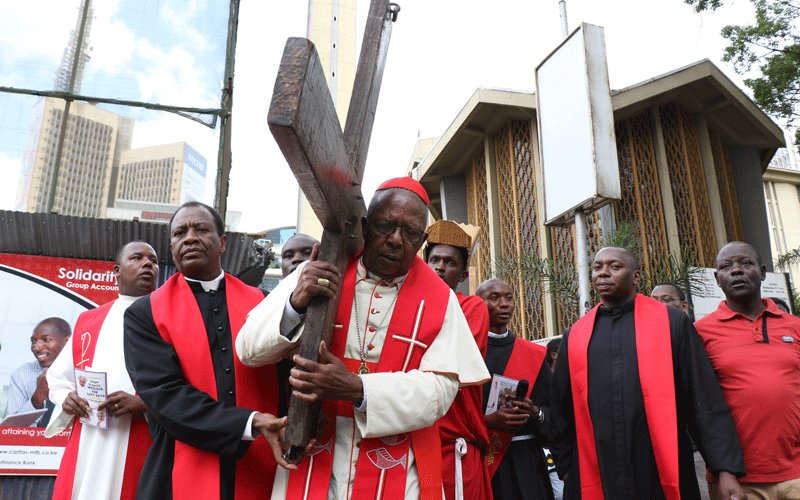Curtains come down on Njue as the archbishop of Nairobi
By Clement Kamau, January 5, 2021The announcement of Cardinal John Njue’s retirement as the spiritual head of the Catholic Church in Kenya yesterday did not come as a surprise after months of speculation over his health.
For almost a year, Cardinal Njue had opted to remain in the periphery of mainstream church and public activities due to what insiders attributed to failing health.
Following in the footsteps of his other colleagues, retired archbishops Zaccheaus Okoth (Kisumu) and Peter Kairo (Nyeri), both who had to write to the Pope requesting retirement, Cardinal Njue is said to have sought permission to take a rest sometimes last year.
Yesterday’s announcement by the Vatican brings the curtain down on the career of one of Kenya’s most prominent clerics, whose career elicited praise and criticism from the church and politicians.
According to insiders, Cardinal Njue was promising when he assumed his role as head of Nairobi Archdiocese in 2007.
He had already earned himself popularity and respect among Kenyans through his hard-hitting sermons against former President Daniel arap Moi’s government, as he pointed out ills committed by the Nyayo administration.
Then a bishop, Njue earned respect among clerics and political leaders advocating democratic space when he told off President Moi to his face at a public function, after the government attempted to take over church-sponsored schools.
Quoting the jab levelled at Communism, he said : “What’s mine is ours but what’s yours is yours. That cannot be.”
The Kenyan community that cheered at anything critical of Moi’s administration was upbeat about Njue’s consecration as archbishop , majority of them seeing a reincarnated Maurice Michael Cardinal Otunga.
But things appeared to take a downward trend when Moi left power left and in came President Mwai Kibaki, a staunch Catholic.
Njue’s critics accuse him of having been muzzled by the Kibaki and President Uhuru Kenyatta’s administrations.
Despite the emergence of mega scandals and many ills under the two governments, Njue’s voice remained largely missing.
“As natural philosophers, given that he too is academically a philosopher, we’re bound to ask why he went silent at a time his flock needed him most. We may not need rational intuism to know the reason.
We will not cite fact sensitivity or fact insensitivity to shield him,” one senior Catholic clergy told People Daily on condition of anonymity due to the sensitivity of the matter.
“It may be due to normative turmoil, but we can’t fail to see he didn’t feel the pinch. Perhaps this is why his retirement can be seen as good riddance,” another priest stated.
Cardinal Njue’s leadership was once again put to question in 2013 when he appeared to side with the Assumption Sisters in a dispute pitting the latter against Father William Charles Fryda of the Maryknoll Fathers and Brothers Society over ownership of St Mary’s mission hospitals and schools in Nairobi and Naivasha.
During a long drawn out court battle, Fr Fryda accused Cardinal Njue and a nun, Marie Therese Gachambi, of the Assumption Sisters, of attempting to take over the hospital unlawfully.
The courts later ruled in favour of the Assumption Sisters, with Fr Fryda opting to establish another hospital, St Joseph’s hospital in Gilgil. But the damage had been done on Cardinal Njue’s leadership.
Priests in the Catholic church also opine the Cardinal failed to live up to public expectations and to march the standards attained by his predecessors in Nairobi, Ndingi Mwana a’Nzeki and Cardinal Otunga. To some, he was a “passenger” cardinal, only to be seen and not to be heard.
His critics accuse him of having abandoned the church during the most critical moments when he was required to provide leadership. For example, in 2005 during the referendum, as the chairman of the Kenya Conference of Catholic Bishops (KCCB), Cardinal Njue is said to have opted to sit on the fence instead of taking a position on the vote.
The same is alleged of him in the 2007/2008 political clashes, 2013 and 2017 general elections when he told his faithful to make individual choices.
However, some in the church say the archbishop’s position was a clever move to avoid dividing the congregation along political party lines.
On other issues, Cardinal Njue has maintained a hardline opposition to abortion, use of contraceptives and allowed his clergy freedom of political association.
While accepting Cardinal Njue’s retirement yesterday, Pope Francis appointed Bishop David Kamau as the Apostolic Administrator of Nairobi Archdiocese.
Bishop Kamau, who until his appointment was the Nairobi Auxiliary Bishop, will serve in the position until a new cardinal is appointed.
Cardinal Njue, who left after attaining the mandatory retirement age of 75 years, can still participate in the election of a new Pope should a vacancy occur, since he has not reached 80 years.
However, before a new cardinal for Nairobi is appointed, all matters pertaining to the Kenya Catholic Church would be represented in Rome by the chairman of the Kenya Conference of Catholic Bishops, Archbishop Philip Anyolo of Kisumu archdiocese.
Archbishop Anyolo, however, can still delegate Cardinal Njue to represent him in Rome.
News of Cardinal Njue’s retirement was announced in Rome yesterday.
“The acceptance letter of Cardinal Njue’s resignation and the appointment of Bishop Kamau was sent to the Kenya Conference of Catholic Bishops (KCCB) by the Apostolic Nuncio to Kenya, His Excellency Archbishop Hubertus van Megen,” a statement from the Catholic Secretariat in Nairobi stated.
Sources within the church intimated that Cardinal Njue may have opted to retire on health grounds. During the Covid-19 outbreak, he largely remained in the background as he delegated most of his duties to Nyeri Archbishop Anthony Muheria.
